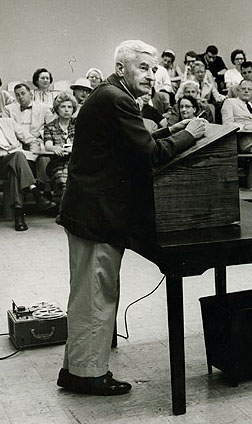Audio Clips
| CLOSE WINDOW TO RETURN TO MAP |

 Photograph by Ralph Thompson © Rector and Visitors, University of Virginia |
During the 1957 and 1958 Spring semesters, William Faulkner was the Writer-in-Residence at the University of Virginia. During that time he appeared at thirty-six different public events, reading from his work and answering over 1400 questions from students, faculty and others. Thanks to two members of the Department of English, Frederick Gwynn and Joseph Blotner, most of those sessions were recorded, and preserved on tape in the University of Virginia Special Collections Library. Over 28 hours of the recordings have been digitized, and are available online in the Faulkner at Virginia audio archive . The mp3 clips available below have been taken from that archive, and are playable on most devices. Writing the Appendix (15 April 1957; 0:33) Caddy and the Nazis (15 February 1957; 0:33) |
Writing the Appendix (15 April 1957; 0:33)
William Faulkner: Yes, sir.
Unidentified participant: In that connection, did you write it in the order in which it was published?
William Faulkner: Yes.
Unidentified participant: It was written in that order?
William Faulkner: Yes. I wrote the Benjy part first. That wasn't good enough, so I wrote the Quentin part. That still wasn't good enough. I let Jason try it. That still wasn't enough. I let Faulkner try it, and that still wasn't enough, [audience laughter] and so about twenty years afterwards I wrote an appendix still trying to make that book what—match the dream.
Caddy and the Nazis (15 February 1957; 0:33)
Frederick Gwynn: Speaking of Caddy, is there any way of getting her back from the clutches of the Nazis, [audience laughter] where she ends up in—in the appendix?
William Faulkner: I think that that would be a betrayal of Caddy, that it's best to leave her where she is. If she were resurrected, there'd be something a little shabby, a little anti-climatic about it, about this. Her tragedy, to me, is—is the best I could do with it. Unless, as I said, I could start over and write the book again, which I can't do.
